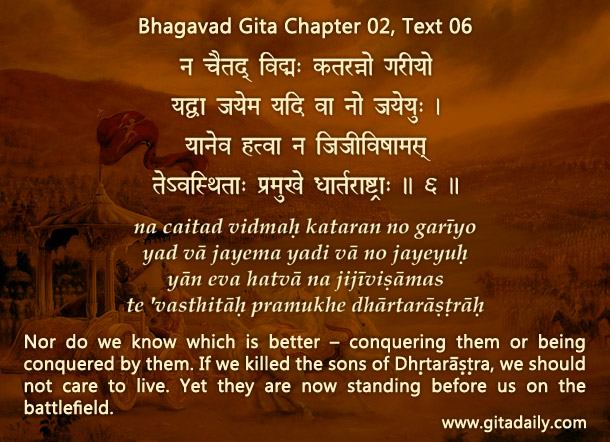Suppose a loved one is terribly sick and needs surgery. We sincerely want to help them, but if we don’t know the ABC of surgery, our sincerity alone won’t make us competent to operate on them. If we still try to operate, that would be stupid, even tragic.
In the Bhagavad-gita, sincerity doesn’t protect Arjuna from perplexity. His sincerity is evident in the Gita’s first chapter where he breaks down on contemplating the impending fratricidal war. He thinks: why should I fight just to win a kingdom? Despite his disarming sincerity, he ends up confused (02.06).
Of course, sincerity is not unimportant; it is because of his sincerity that Arjuna turns to Krishna for guidance (02.07). Thereby, he gets the intellectual ability to see the reality of the situation: the war is being fought not to win a kingdom, but to establish dharma. He needs to neutralize anti-social elements who had unscrupulously grabbed power. All living beings, including the power-grabbers, are eternal souls on a multi-life journey of spiritual evolution; Arjuna’s neutralizing the power-grabbers will further their spiritual evolution.
Our sincerity can attract divine grace which can grant us the necessary ability. But if we see sincerity as a substitute for ability, we may sentence ourselves to stupidity. Unfortunately, on the spiritual path, we often equate sincerity with ability. First, we presume that we are sincere, especially when we do something good such as follow a spiritual path. Second, we presume that if are sincere in following that path, that’s all we need. We certainly need sincerity, but it alone doesn’t guarantee that the path we are following is right.
When we complement sincerity with receptivity to Gita wisdom, we will get, by divine grace, the ability to discern the right path.
Think it over:
- How may we be sincere and still do something stupid?
- How does the Gita’s setting demonstrate what sincerity can and can’t do?
- Do you equate sincerity with ability? How can you change that?
***
02.06 Nor do we know which is better – conquering them or being conquered by them. If we killed the sons of Dhritarashtra, we should not care to live. Yet they are now standing before us on the battlefield.
***
02.06 Nor do we know which is better – conquering them or being conquered by them. If we killed the sons of Dhritarashtra, we should not care to live. Yet they are now standing before us on the battlefield.
To know more about this verse, please click on the image
Explanation of article:
Podcast:



Hare Krishna,
Respected pr ji, I have 2 questions,
the war is being fought not to win a kingdom, but to establish dharma. He needs to neutralize anti-social elements who had unscrupulously grabbed power.
Q1. Were Kauravas & their company causing harassment to the subjects they were ruling? Were they on the same platform as Kamsa/Hiranyakashi pu/King vena – who out rightly stopped sacrifice to vishu, killed cows, & brahmana, abducted women & violated them.
Arjuna’s neutralizing the power-grabbers will further their spiritual evolution.
Q2. How did Arjuna’s neutralizing the power grabbers helped them evolved spiritually? Krishna mentioned that they would achieve heavenly kingdom but could heavenly kingdom be compared with spiritual evolution?
Thanks,
Hare Krsna
Navdeep
https://www.thespiritualscientist.com/2020/05/were-the-kauravas-harassing-their-citizens-were-they-tyrants-who-needed-to-be-removed-by-force/
https://www.thespiritualscientist.com/2020/05/how-would-the-kauravas-being-neutralized-by-the-pandavas-further-their-spiritual-evolution/
Dear swami, i have a doubt regarding Arjuna, “Why Arjuna wanted to be the best archer in the world?
https://www.thespiritualscientist.com/2020/05/why-did-arjuna-want-to-be-the-greatest-archer/